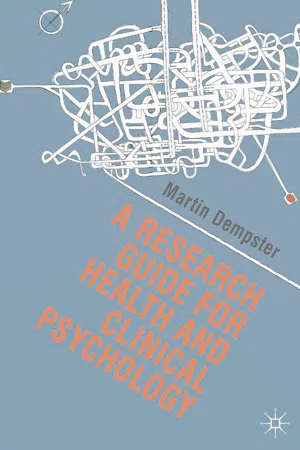Psychology
Applied Research In Psychology
Applied research in psychology involves using psychological principles and theories to address real-world problems and improve people's lives. This type of research focuses on practical applications, such as developing interventions for mental health issues, improving educational strategies, or enhancing workplace productivity. It aims to directly impact individuals, organizations, and communities by translating psychological knowledge into tangible solutions.
Written by Perlego with AI-assistance
Related key terms
1 of 5
7 Key excerpts on "Applied Research In Psychology"
- eBook - PDF
- K. Hillner(Author)
- 2000(Publication Date)
- North Holland(Publisher)
269 CHAPTER 10 APPLIED, PROFESSIONAL PSYCHOLOGY Psychology exists in two forms: (1) pure, academic, or experimental and ( 2 ) applied or professional. Experimental psychologists conduct basic research in such traditional substantive areas as sensation, perception, learning and conditioning, motivation, physiological, and comparative, typically without regard for the possible practical applicability o f their research findings. Applied psychology con- sists o f such substantive subareas as clinical, ab- normal, psychoanalytic psychology, behavioral medi- cine, forensic psychology, counseling, industrial, community psychology, vocational, child, education- al, and military psychology. Such areas as develop- mental and social are more equivocal, possessing both pure and applied aspects. Not every psychologist would agree with this rather strict dichotomization between pure and ap- plied psychology. Many experimental psychologists consider the results o f basic laboratory research to be inherently applicable to the behavior occurring in the natural environment; and certainly many psy- chologists who classify themselves as applied in or- ientation conduct high level, meaningful research possessing theoretical significance. Granted there 270 CHAPTER 10 is much overlap between pure and applied psychology, the distinction is relevant for at least four reasons. - eBook - PDF
A Critical History and Philosophy of Psychology
Diversity of Context, Thought, and Practice
- Richard T. G. Walsh, Thomas Teo, Angelina Baydala(Authors)
- 2014(Publication Date)
- Cambridge University Press(Publisher)
Two themes that seem to capture the central issues underlying psychologists ’ historical practices of applications of their science: unreflective faith in the scientific basis of social and professional applications, and alliance with the societal status quo. Part 1 The emergence of applied and professional psychology .................................................................................. Psychology is self-consciously concerned with applications and relevancies to everyday life (Rose, 1979 ). It has promised to be the scienti fi c discipline that would address the practical needs and problems of contemporary society: education, war, crime, insanity, and business. Allegedly unburdened by metaphysical speculation and the philosophy of human nature, this new discipline would use the discourse and practices of science and medicine to take on the problems of maintaining and promoting social order. In early twentieth-century US society, psychologists did not distinguish distinct special-ties. Only later did the application of Psychology to contemporary problems result in psychologists claiming specialization in areas of industrial/organizational psychology, school psychology, counselling psychology, and clinical psychology. Furthermore, the distinction between applied and basic psychology, often made in the period before World War II in US Psychology, is misleading, because there was very little 356 Applied and professional psychology basic Psychology to apply to societal problems. Psychologists found applications as they went along, searching for areas to apply principles and techniques. Responding to market forces meant Psychology became intertwined with socioeconomic and political develop-ments in the culture at large (Danziger, 1990 ). Psychology as a science that measures and classi fi es individuals came to be of primary importance for managing people and upholding institutions such as commerce, industry, prisons, hospitals, schools, and the military. - eBook - PDF
- Roy F. Baumeister, Kathleen D. Vohs, Roy Baumeister, Kathleen D. Vohs(Authors)
- 2007(Publication Date)
- SAGE Publications, Inc(Publisher)
While both groups have valid critiques of an admit-tedly murky field, it is important to emphasize that applied social psychologists are actively engaged in the scientific study of social issues. While this problem-oriented approach does take some emphasis away from theory building, the plethora of field observations and unique program implementations essential to applied research will only serve to strengthen and refine cur-rent and future social psychological theories. Although the oversimplification of research findings could lead to the improper implementation of social programs, applied social psychologists seek to prevent such use by taking an active role in designing socially respon-sible policy. A final issue to note is that the implied divide between applied and basic research ignores the contri-butions that basic social psychologists often make to areas of application. While applied social psychology refers to research with a problem-oriented focus, it is much more difficult to define who meets the defini-tion of an applied social psychologist. Many psychol-ogists primarily focused on basic laboratory research are also actively involved in the Society for the Psychological Study of Social Issues and other orga-nizations committed to the application of social psy-chological principles. Brandon I. Brockmyer Kathryn C. Oleson See also Ecological Validity; Quasi-Experimental Designs; Research Methods Further Readings Bickman, L. (1980). Introduction. Applied Social Psychology Annual, 1 , 7–18. Goodwin, C. J. (1999). A history of modern psychology (chaps. 8 & 9). New York: Wiley. Oskamp, S., & Schultz, P. W. (1998). Applied social psychology (2nd ed.). Upper Saddle River, NJ: Prentice Hall. Schultz, P. W., & Oskamp, S. (2000). Social psychology: An applied perspective . Upper Saddle River, NJ: Prentice Hall. Applied Social Psychology ——— 47 A PPROACH –A VOIDANCE C ONFLICT Definition Approach means moving toward something. - eBook - PDF
Research in Psychology
Methods and Design
- Kerri A. Goodwin, C. James Goodwin(Authors)
- 2016(Publication Date)
- Wiley(Publisher)
Research can be classified in terms of its goals, setting, and type of data collected. We will make the distinctions between the following varieties of research: (a) basic or applied research, (b) laboratory or field research, and (c) quantitative or qualitative research. The Goals: Basic versus Applied Research Some research in psychology emphasizes describing, predicting, and explaining the fundamental principles of behavior and mental processes and such research goals define basic research. Traditionally, those involved in basic research in psychology have studied such topics as percep- tion, learning, cognition, and basic neurological and physiological processes as they relate to psychological phenomena. In contrast, applied research is so named because it has direct and immediate relevance to the solution of real‐world problems. To illustrate the distinction, consider some research in the area of attention (a topic with a long history—recall the 1913 Dallenbach study in Box 1.1 in Chapter 1). A basic research study might investigate the ability of people to simultaneously complete two different information‐processing tasks in a laboratory. The researcher might examine the effects of the similarity of the tasks, their difficulty, and so on. One well‐established method involves “shadowing” in a “dichotic listening” task, a technique pio- neered by Cherry (1953) and Broadbent (1958) in England. A research participant in this type of experiment wears earphones, with a different message coming into each ear simultaneously. The task is to focus attention on one message and shadow it—that is, while the message in one ear (the “attended” ear) is being heard, the subject tries to repeat out loud the message verbatim, as it is being heard. Of interest is what happens to the message coming into the other (i.e., the “unat- tended”) ear. - eBook - PDF
- K. Hillner(Author)
- 1987(Publication Date)
- North Holland(Publisher)
Psychological Application 267 cognitive psychology. APPLIED PSYCHOLOGY VERSUS PRACTICAL APPLICATION Perhaps the reader has sensed a subtle distinction be- tween the notions o f applied psychology and psychologi- cal or practical application. Some types o f psychology are explicitly construc- ted as applied psychology: for instance, understanding psychology and depth psychology. The domain o f psy- chology presumably is coextensive with the real world or the received world as given. Epistemological as- pects o f such psychology merely are secondary. The paradoxical characteristic o f an applied psychology is that it does not yield any real practical application techniques, i.e., descriptive mechanisms, by which ac- tual psychological change can be implemented. This is due to the fact that applied systems are nonepistemo- logically oriented and do not necessarily touch bases with the real world. Some types o f psychology are explicitly construc- ted as epistemological systems: they are supposed to represent, model, or provide a coherent interpretation o f the natural universe. More importantly, the degree o f correspondence existing between the constructed psy- chological universe and the real world is empirically assessable. Action psychology and contemporary cogni- tive psychology are empirically oriented systems in the tradition o f the hard sciences. Epistemologically or- iented systems derivatively constitute an applied psy- chology: practical application techniques, amenable to empirical evaluation, are derivable from the abstract psychological principles subsumed by these systems. The normative change imperative is built into the very fabric o f applied psychology; it is only a secon- dary consideration in an epistemological system affor- 268 Chapter 8 ding practical application. This is one reason why the understanding and depth approaches are so evalua- tive and subject to exploitation. - Martin Dempster(Author)
- 2011(Publication Date)
- Bloomsbury Academic(Publisher)
Being able to manage this uncertainty in the midst of the complexity of your research design and being able to develop novel solu-tions for problems encountered are two of the most important skills that a psychologist develops through their research training. In summary, then, I think the aim of research is learning. Research outcomes help us to learn more about an area and to formulate ques-tions to develop this learning; the research process helps us to learn about ourselves, how we respond to uncertain and complex situations and how we work as part of a research team. 1.3 Research collaboration Most research is conducted by research teams, although in many cases the team might comprise only two people (you and a supervisor). The success or otherwise of research teams tends to be judged by their research 10 A research guide for health and clinical psychology outputs. However, good quality research outputs are unlikely to be pro-duced by a dysfunctional team – the success of a research team depends as much on the management of inter-personal processes as it does on research-specific skills. Learning how to communicate effectively, develop your leadership role within a team and be a productive and collaborative team member are essential skills that you will develop throughout your training towards qualification as a psychologist. The research element of your training will contribute greatly to this development. 1.3.1 How do I choose a research supervisor? The method of choosing, or being allocated, a research supervisor will depend on the specific procedures in place in your training programme. Many training programmes will allow the trainees to have some element of choice, but the choice of supervisor might very well be tied to the choice of research area. In many institutions, staff are assessed on the basis of their research output and are encouraged to be focused in their choice of research topics.- eBook - PDF
Research Methods
A Tool for Life
- Bernard C. Beins(Author)
- 2017(Publication Date)
- Cambridge University Press(Publisher)
To study the factor that has a small effect, you need a controlled environment to offset the effects of the unwanted variables. If the research question involves an application relating to a particular environment like a business, the investigator needs to conduct the study in a business setting. Another decision is whether to test people one by one or in groups. If people are tested in groups rather than individually, they might perform differently on their tasks. Social psychologists have found that people perform differently when they think oth- ers are observing them. Zajonc (1965) reported that even rats and ants work differently when in groups. If you are conducting your own study, it could make a difference whether your participants are alone or in groups, but you often do not know whether their perfor- mance changes for the better, for the worse, or in ways that are irrelevant to what you are measuring. Very often, applied research takes place in a natural environment where people are acting as they normally do. Basic (theoretical) research is more likely to occur in a laboratory Basic (Theoretical) Research—Research that tests or expands on theory, with no direct application intended. PRACTICAL ISSUES IN PLANNING YOUR RESEARCH 99 or other controlled setting. The reason for choosing a natural environment for research is that it represents the actual question you want to answer: How do people behave in a particular situation? On the other hand, when psychologists conduct theoretical research, we often want to simplify the situation so we can identify the effect of a single variable that might get lost in a complex, real-world setting. CHOOSING YOUR METHODOLOGY After you have operationally defined your concepts and variables, you can establish your methodology. Psychologists have developed many techniques to study a wide variety of behaviors.
Index pages curate the most relevant extracts from our library of academic textbooks. They’ve been created using an in-house natural language model (NLM), each adding context and meaning to key research topics.






